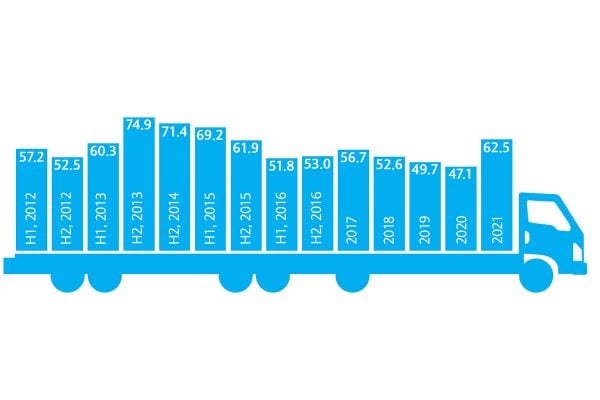 Following today’s news that Parcelforce are happy to terminate contracts on short notice if the parcels don’t fit their ideal profile, Becky Clark, CEO of NetDespatch looks at the effects of last year’s Black Friday and Cyber Monday on the supply chain and what the industry can do to make the next set of holidays a successful one.
Following today’s news that Parcelforce are happy to terminate contracts on short notice if the parcels don’t fit their ideal profile, Becky Clark, CEO of NetDespatch looks at the effects of last year’s Black Friday and Cyber Monday on the supply chain and what the industry can do to make the next set of holidays a successful one.
Last Winter, the UK’s online shopping habits changed for good as the country’s media focused its attention on the shopping phenomenon that is ‘Black Friday’- a day of heavily discounted goods, historically the preserve of the Americans. Prior to this media attention – while many UK consumers would likely be familiar with the concept of Black Friday – most would not mirror American consumer behaviour of planning big ticket purchases on this day in order to benefit from its significant price reductions.
The participation of major electrical and white goods retailers in 2014, however, heralded the ‘full’ arrival of Black Friday in the UK. Unprecedented online sales which exceeded everyone’s expectations, however, heavily impacted carrier operations at an already busy period prior to Christmas.
The situation was compounded by the arrival of Cyber Monday only days later and so, combined, the two events created a shopping phenomenon which retailers were not prepared for and which carrier firms simply couldn’t deliver on. Sadly, this delivery ‘twin Tsunami’ killed Christmas for many retailers.
Black Friday will almost certainly be repeated in 2015 and so, armed with the knowledge that shoppers will hold back on starting their Christmas shopping until this date; how should retailers adjust their planning to cope with these peaks in demand?
The issue arose from the compression of Christmas shopping into a shorter period than was expected. The established trend was for two successive weekends of high sales activity, with the peak arriving the weekend after Black Friday / Cyber Monday – sometimes referred to as ‘Mega Monday’.
1. Plan Ahead!
The biggest problem for retailers last year was the sheer volume of orders compressed into such a short period of time. So with the benefit of hindsight and the ‘new world’ shopping dates firmly in mind, retailers could incentivise consumers to wait a little longer for deliveries. So, for consumers purchasing Christmas gifts in early December, retailers should be looking to aid the carrier firms by making the delivery costs for three-five day delivery extremely attractive, and the costs for less than three days extremely unattractive in order to ease the pressure. An extra load over three-five days for a carrier can be more effectively planned for. Unexpected high volumes for next day delivery quickly pile up, and create a tsunami effect.
2. Communication of delivery options.
If retailers are going to successfully manage the peak volumes of their online sales and keep the cost of despatch and delivery down, they need to ensure they are communicating to consumers the wide range of delivery options available. Delivery costs can be reduced significantly, for example, if carriers drop off 50 parcels at one Click & Collect location, as opposed to making 50 individual journeys. Are consumers aware that then could have parcels delivered to their work address or a local garage or convenience store? Not only does this reduce costs for the carriers, but it can also be more convenient for the consumer who no longer has to take time out of work to wait at home for a parcel delivery.
3. Integrated ecommerce system.
Having seamlessly integrated systems for the first and last mile of delivery is the name of the successful delivery game. Retailers – however small – need to ensure they have a seamlessly integrated fulfilment and despatch operation, so that when an order is labelled and ready for despatch, the carrier knows almost instantly. If systems are NOT seamlessly integrated, then the information provided by the consumer will need to be manually re-entered, perhaps into multiple systems, which slows down the whole process, increases costs, as well as the risk of human error, and thus the likelihood of failed deliveries. In terms of last mile delivery; it is critical that ecommerce and/or operational systems are integrated at the point of despatch with the selected postal and parcel carriers. If the carrier knows what’s in the pipeline in real-time, then they can re-plan for unexpected traffic before the parcels are even collected. At NetDespatch, we can offer our carrier customers an ‘early warning system’ so that, if an online retailer suddenly starts handling more traffic, we can warn the carriers, they can plan around that information, helping to ensure that delivery times remain as expected.
As I write this article; one of our customers springs to mind as an example of a small retailer who got it right. Toad Footwear, a Derbyshire-based independent shoe shop, has dramatically improved its despatch processes having moved to a seamless integration system between its order management system, Magento, and the delivery network of the company’s parcel carrier, Royal Mail.
Previously involving manual entering of parcel details into a labelling system, the new integrated solution has automated the whole order-to-despatch process, and has been a great success. The solution has also streamlined Toad Footwear’s accounting processes, since it is integrated with the carrier’s billing system.
Drage Thompson of Toad Footwear comments, “The NetDespatch solution has revolutionised our business. We have a staff of seven, and our roles have changed since we implemented the new system because it saves us so much time”.
Shopping peaks offer retailers opportunities of cosmic proportions if they can plan for the peaks with accuracy, but get it wrong and those peaks could become speed bumps that hit them hard. So, what’s the answer? It’s simple; plan ahead and all will be well. But leave it to the last minute and we’ll see the all too familiar negative headlines in the media once again this Christmas. And nobody in the industry wants to turn the promise of a bumper sales period into the nightmare before Christmas!










